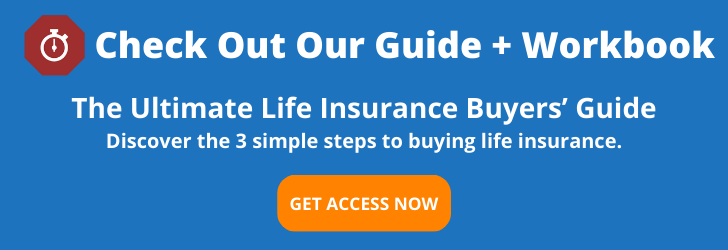11 Jan 27 Questions to Ask before Purchasing a Life Insurance Policy

Life insurance should be a critical part of your financial plan – especially if you have a partner, dependents, or relatives who depend on you financially.
However, it’s a product that’s often sold to consumers with little inquiry into the why behind it and how the money will be used upon death.
Having a solid understanding of life insurance, why you need it, and the different types available to you can help you better plan for your family’s long-term financial needs.
Keep reading for 27 must-ask questions before you purchase a life insurance policy.
#1 Why do I need life insurance?
This is the #1 question you must answer before you decide to purchase life insurance because it’s not a one-size-fits all product and the policy can be used in a number of ways – depending on what you need it for.
Everyone has unique needs, and the type of life insurance and the amount (or whether you need it at all) depend on a variety of factors.
These may include:
- Your marital status
- If you have childrenI
- f you have a dependent or relative with special needs who relies on you for financial support
- If your death will financially burden your family
- If you expect to owe estate taxes
- If you have large debt obligations
- If you own a business where partners or joint owners could use policy proceeds to purchase your shares of the company upon your death
If you have any financial obligations that your loved ones will need to cover after you’re gone, then you need life insurance.
[Related Read: How Much Life Insurance Do I Need?]
#2 What type of life insurance is right for me?
The type of insurance you select depends on how you answer question #1 above.
There are two main types of life insurance today: Term Insurance and Permanent Insurance.
Term Insurance:
Term life insurance is the most basic and usually the most affordable.
Policies can be purchased for a specific time frame.
If you die within the period in your policy, the insurance company will pay your beneficiaries the face value of your policy.
Permanent Insurance:
With permanent life insurance, you pay a premium for as long as you live, and the face value of the policy will be paid to your beneficiaries upon your death. Permanent life insurance usually comes with cash value.
There are three main types of permanent life insurance: whole, universal, and variable.
[Related Read: Types of Life Insurance Explained]
#3 Do I need life insurance if I already get it through work?
Obtaining life insurance through work can be a great start, especially if you don’t have a policy yet.
Be aware that if you lose or quit your job, you may also lose your life insurance coverage.
#4 How much life insurance do I need?
Because everyone’s needs are different, the type and the amount of life insurance that you should obtain will depend on a variety of factors that are specific to you.
What is your overall purpose in purchasing life insurance?
How does it fit into your financial planning?
Ultimately, the main reasons people purchase life insurance are to replace the income of the primary wage earner, pay off debt (mortgage, college, car, etc.), and cover final expenses (burial, estate taxes).
Keeping this in mind, determine how much money you need to cover these three areas:
STEP #1: Determine how much money is needed to replace income. Start by multiplying your annual income by the number of years you want the income to continue.
STEP #2: Assess your debt or the financial obligations your family will be stuck with after you pass away. Add up your mortgage, credit card debt, school tuition, loans, etc. Factor in the amounts for future expenses you’d like to cover, such as a child’s college costs or wedding.
STEP #3: Consider final expenses, such as funeral costs. Many families do not have thousands just sitting around to pay for final expenses.
[Related Read: Is Burial Insurance Worth It?]
#5 How much does life insurance cost?
The cost of life insurance varies significantly depending on several factors, such as your age, health, and the type of life insurance you choose.
#6 Is there a discount if I pay annually versus monthly?
Most companies will offer you a discount on the cost of life insurance if you pay annually, semi-annually, or even quarterly, versus a monthly payment. Ask for the discount!
#7 What happens if I miss a payment?
With a term policy, your policy may lapse if you miss payments.
If you have a permanent policy, there may be options to pay your premium with your accumulated cash values.
#8 Will my premiums change or increase over time?
Usually, your payments are fixed for the time frames chosen.
Once you reach the end of a term, the premiums may go higher at that time. With permanent policies, your premium tends to stay fixed for life. Again, read the fine print of the policy.
#9 Can I increase or decrease the benefit amount after the plan goes into effect?
Normally, insurance companies will allow you to decrease the face amounts of your policy without restrictions.
But, if you increase the face amount, you may have to qualify for the increase.
This may include a new paramedical exam.
#10 Is there a waiting period before my benefits start?
There may be a waiting period from the time you pay your premiums to the time the benefits start.
This depends on the insurance company guidelines so make sure to read the fine print before you sign.
#11 What if I outlive my coverage?
If you outlive your term life insurance, the policy will end with no values.
Some policies allow you to continue for higher premiums or convert to a permanent policy.
If you outlive your whole life policies (usually age 100), the policy matures and pays out all the cash value.
#12 Why are there so many medical questions on the life insurance application?
These questions are necessary to verify your identity, determine your health, review your medical background, and, ultimately, determine your rate class for the policy.
#13 Can I be denied coverage?
Yes. There are several reasons that you could be denied, depending on the company.
They may want to know your health history, mental health history, dangerous hobbies, age, job, financial status, if you’ve declared bankruptcy, and your driving and criminal record.
#14 What are the different ratings for?
You may see ratings such as Preferred, Standard, and Rated. Life insurance classifications are based on your health history and used by insurers to set your policy premiums.
#15 Does the plan require a physical exam?
Most life insurance policies do require a medical exam.
If you’re terrified of needles (you know who you are!) or if you have a pre-existing medical condition and don’t want to sit through the exam, no-medical-exam life insurance may be an option. Just expect a higher premium if you qualify.
[Related Read: What Is No-Medical-Exam Life Insurance?]
#16 Whom do I select as my beneficiary?
A beneficiary can be a person, charity, business, or trust.
If the beneficiary is a person, they can be a relative, child, spouse, friend, or anyone else you happen to know. You can also have more than one beneficiary on your policy.
#17 Can I change beneficiaries over time?
Yes, you can always change your beneficiaries.
There are sometimes where you may need permission to do this, specifically when it involves community property states and irrevocable beneficiaries.
#18 How are death benefits paid?
Every insurance company will have specific payout methods at death. Make sure you understand how the payout process works before you sign the contract.
#19 Are there reasons that allow an insurance company to not pay a claim?
Yes. Here are a few common ones: You lied on the application, death while committing a crime, stopped paying premiums, and death by suicide in the first two years.
#20 How long does it take to pay a death benefit?
This depends on the insurance company. Most are very quick (days, not months) and will require a certified death certificate.
#21 What if I move out of state or the country?
Insurance laws could change state to state, so you would need to check with the issuer to see what is different if you move.
#22 How can I get life insurance?
It can be purchased online, over the phone, or in person with a licensed agent.
#23 How can I check out the insurance company before I buy a policy?
You can research life insurance companies online and check out reviews. Also, you can check the complaints with your state’s insurance division.
#24 What happens if my insurance company gets sold?
It depends on the terms of the agreement. Usually the new company will continue the policy as is.
#25 What happens if my insurance company goes out of business?
If an insurance company fails, the state guaranty association (guaranty fund) steps in.
The association will transfer the insurer’s policies to another insurance company or continue providing coverage itself for policyholders.
#26 Where do I go if I have problems after I purchase?
First contact the insurance company’s customer service department. If you don’t get answers, head to your state insurance division to lodge your complaint.
#27 How long does it take to get a policy?
It typically takes 2-4 weeks to get life insurance. However, if you choose a non-medical-exam life insurance policy, you can get life insurance in as little as 24 hours.




No Comments